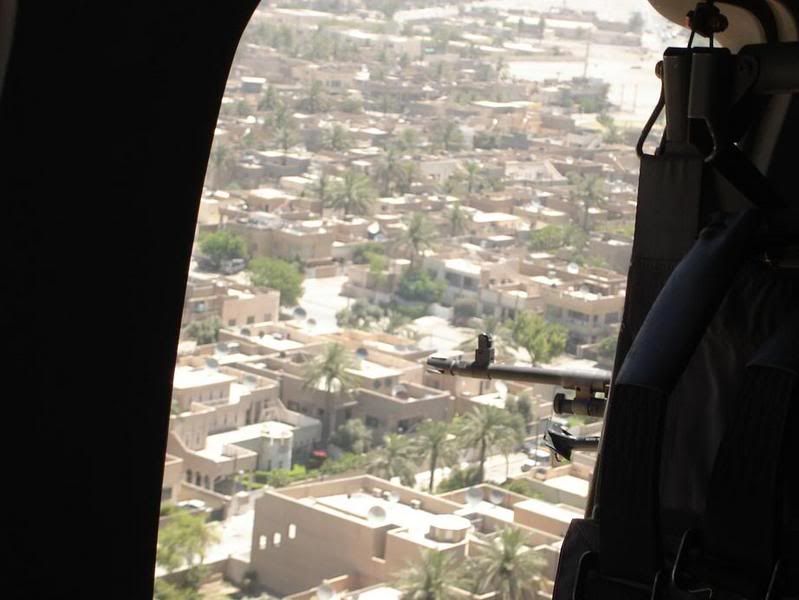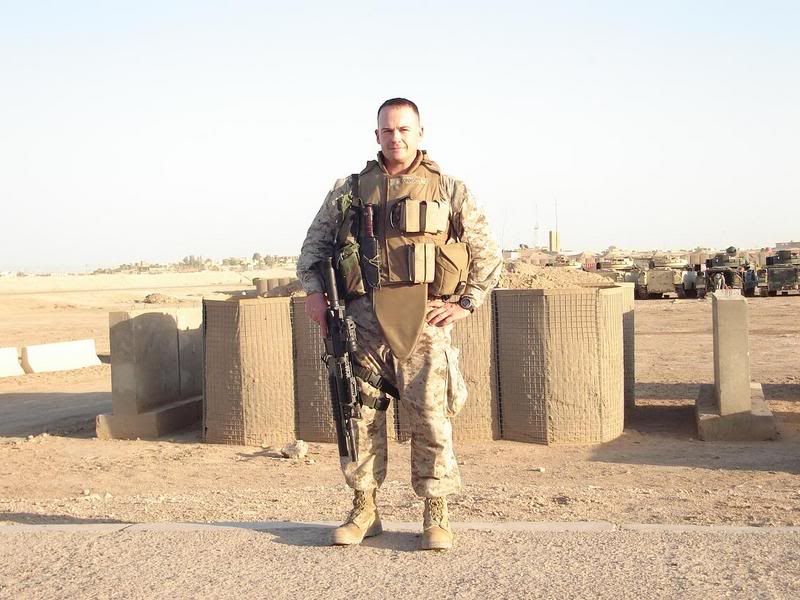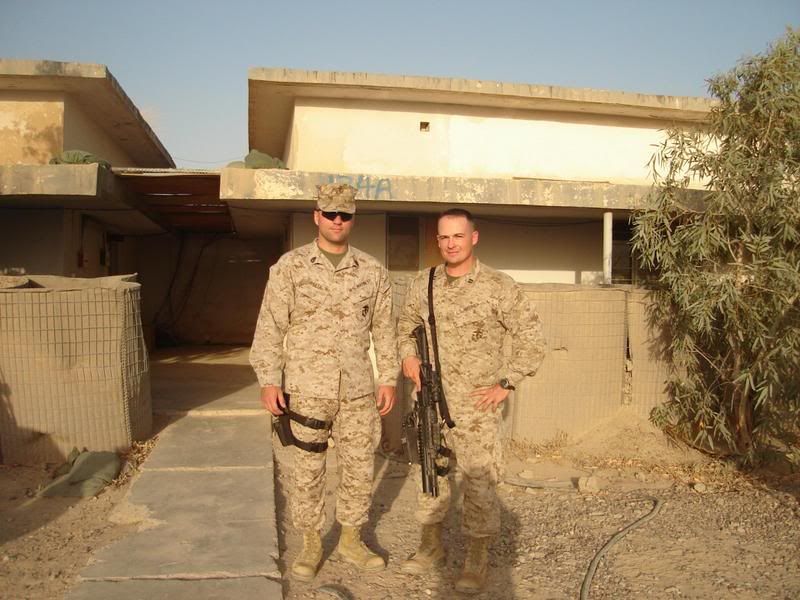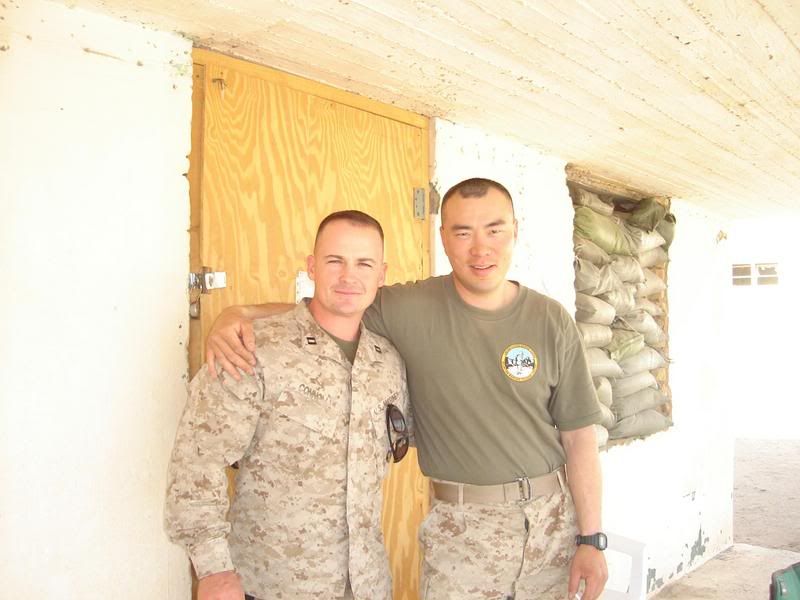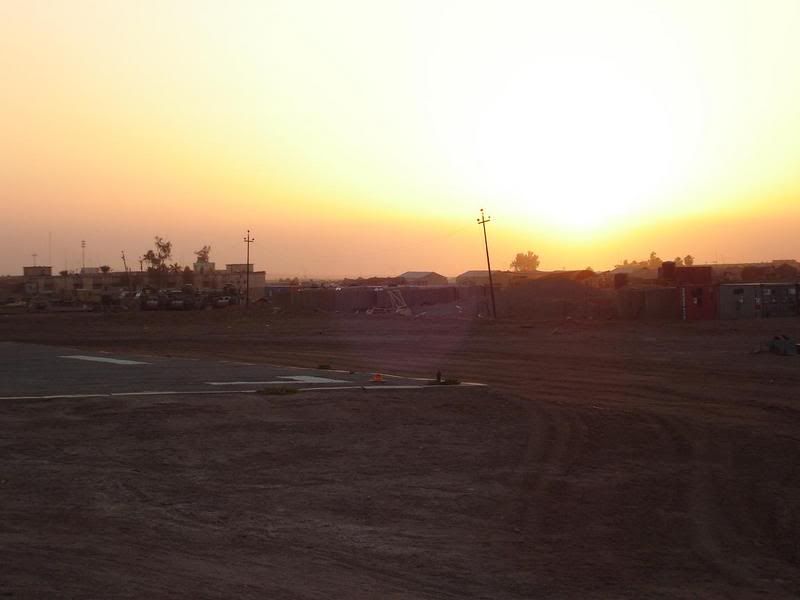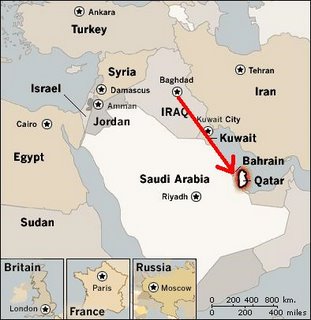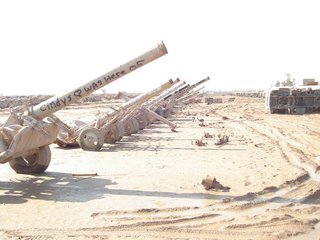FOB SHIELD TRIP
During my trip to Qatar in May, I met a Marine Corps officer named Major Gary De Wet. He told me I should visit the base he lived on to see how the
 base protected itself from the hostility that surrounded it in East Baghdad. Maj De Wet was the "Mayor" of FOB (forward operating base) Shield. That meant that he was in charge of all base operations, including security. It also meant that he would be a great host. I had arranged to take a short trip there with a friend of mine, a Navy officer named Mark Radlinski.
base protected itself from the hostility that surrounded it in East Baghdad. Maj De Wet was the "Mayor" of FOB (forward operating base) Shield. That meant that he was in charge of all base operations, including security. It also meant that he would be a great host. I had arranged to take a short trip there with a friend of mine, a Navy officer named Mark Radlinski.* * *
Wedesday, 21 June 2006
Forward Operating Base Shield, Baghdad, Iraq
The Martyr's Monument sits in a large expanse of cleared out fields and parks in east Baghdad. It is a huge structure, the color of dark and gleaming turquoise, looks like spade-shaped shell that has been parted down the middle and split apart. I could see it from the helicopter, and it seemed like we were about to fly right over it. But instead, we banked right, and began to slow down, approaching a cracked cement landing pad in a compound to our right. A field of tall reeds blew around in the rotor wash as we settled down onto the pad, passing just over a line of cement "t-wall" barriers, and just between two sandbagged guard towers. We dragged our things from the helicopter. Mark and I both had our field packs with us. I also had a bag for my laptop and books. We each carried two ammo cans full of 5.56mm ammuntion that we were delivering to Major De Wet for his guard force to use.
After the helicopters took off, an armored Suburban that had been waiting for us drove across the pad. The driver was a South African guy named Andre that worked for EODT, the civilian company that had been hired to run security on the base. He was lean, fit, and tanned; in his early 40's. He wore a Marine Corps boonie hat, and had a full goatee without a mustache. He drove us from the helicopter pad and into FOB Shield. The FOB is a heavily guarded compound that sits near several high-visibility government sites, including: a prison full of inmates (some on death row), the Ministry of the Interior, the Baghdad Police College, the Ministry of Oil, and the Ministry of Water.
FOB Shield is very small, and is packed with vehicles, trailers, small concrete buildings, sandbags, dirt-filled HESCO barriers, and T-walls. We pulled up to a small building that housed the Operations Center and the Mayor's cell, where Maj De Wet worked. When we walked in, he was busy talking to an irate Army Colonel. The colonel was apparently pissed off that he didn't have his own gate that would allow himself and his team to drive onto the FOB from the Ministry of the Interior area. The colonel felt (as many colonels in Iraq do) that his mission was a very high priority for the generals in Iraq, and so his time was very valuable. Maj De Wet ended up winning the argument, but it took a couple of other colonels getting involved. Providing good security to an installation is often a battle in Iraq, because a lot of military personnel want exceptions to be made when it comes to themselves. Force protection is inconvenient for them. But the people that provide the protection have a greater responsibility, and they must consider worst case scenarios. So they usually win arguments.
When the colonel finally left, Maj De Wet was able to meet with us. He showed us where we were at on the overhead photos on the wall, and explained to us how the base was laid out. Today was obviously going to be a busy day for him, and we almost felt as if we were imposing, dropping in as we were. But in the end, in a combat zone, helping hands are always needed, and so it was just a matter of finding a way for us to contribute. Mark and I were not clueless spring chickens; we were both competent men that were anxious for adventure. It would have been easy for Maj De Wet to pawn us off on someone, or tell us that it was a busy time, and that we should just go find things to do. (In fact, we could have done that and been perfectly happy.) But as I've mentioned many times in this journal already, Marines simply do not treat each other that way, especially in a far-off land, or a war zone like Iraq. We take very good care of each other. Even though the Major had much to do, he made sure we were taken care of. It was a simple coincidence that Maj De Wet was half South African, and about half of the EODT guys on FOB Shield were South African. But that's the way it was, and it sure as shit worked to our advantage. These guys were the coolest and most professional contractors you could ever expect to meet.
After we had shot the shit for a couple of hours, we decided to go eat lunch. I really don't know how USMC chow halls in the US will ever be the same. We go to Iraq, and the food is absolutely insane. FOB Shield had the reputation as having the best chow hall in Baghdad. I suppose the reason is that much of their food had to be prepared fresh. Indeed, the food was at least twice as good as anything I had eaten in Iraq up to that point. We sat at one of the long chow hall tables. I ate leg after leg of King Crab, tearing up my fingers, rubbing my skin raw and broken on the the thick crab shell as I tried to break it. I had a couple of cups of coffee, preparing to battle the 1 o'clock heat. We left the chow hall and began knocking on doors in a section of the camp that some National Police Training Team (NPTT) worked in. These are teams of Americans that are attached to the Iraqi National Police. Part of my job is to find ways to support them in the field. Eventually we found our way to the office of the NPTTs' headquarters. It was a small office of 5 or 6 desks. Maps lined the walls. At the end of the office was a huge picture map of Baghdad, which took up the entire wall. We spent two hours talking to the members of the
 NPTTs about support and training issues they were having in the field. About half way through our interviews, a couple of NPTT members came into the office to talk to their team leader. One of the team leaders, a Lt. Colonel, apologized to us for not having time to talk just that minute. Some intelligence had just come in. An interview had just been completed with an Iraqi that said he knew the whereabouts of two US soldiers that had been missing for the last several days. He said the soldiers were dead. These two soldiers had been kidnapped during an attack on their checkpoint in southwestern Baghdad. The soldiers' story was all over the US news at that point. And we were there in the room when the intelligence came in that would lead to the soldiers' location. Sure enough, that evening, the news reported that the missing soldiers' bodies had been found. Our trip was already shaping up into an interesting one.
NPTTs about support and training issues they were having in the field. About half way through our interviews, a couple of NPTT members came into the office to talk to their team leader. One of the team leaders, a Lt. Colonel, apologized to us for not having time to talk just that minute. Some intelligence had just come in. An interview had just been completed with an Iraqi that said he knew the whereabouts of two US soldiers that had been missing for the last several days. He said the soldiers were dead. These two soldiers had been kidnapped during an attack on their checkpoint in southwestern Baghdad. The soldiers' story was all over the US news at that point. And we were there in the room when the intelligence came in that would lead to the soldiers' location. Sure enough, that evening, the news reported that the missing soldiers' bodies had been found. Our trip was already shaping up into an interesting one.Earlier in the day, while we were sitting in Maj de Wet's office, he started introducing several of EODT's security staff to us. The site manager, Casper, worked in the mayor cell office, sitting opposite Maj de Wet and his Marine First Sergeant, 1stSgt Crespo. Casper was a huge man. A former professional rugby player, his ears still bore the scars of his playing days. They had been rubbed and flattened until they pressed up against his head, shiny with the repetitive scarring. He was gruff looking, though he was pleasant enough. The South Africans we would meet during the trip all had accents that were somewhat different from each other. Casper was the hardest of them to understand. I suppose it's because I'm not used to an Afrikaans accent, but I'd estimated I understood about 60% of the words that came out of his mouth. Another South African EODT worker, Stephen, came into the office that morning. He walked into the room, sweating from the hard work of his morning routine, checking on gates and guard posts, climbing stairs in the building summer heat of Baghdad. Since Maj de Wet was going to be busy for much of the day, Stephen offered to take us out to the range to shoot some weapons. "Definitely," we said. Just before we left for the range, we stopped in to talk to the USMC NPTT team leader, Maj Greeno. Maj Greeno was a very personable guy that was more than happy to talk to us about support and training issues with his team. But we told him we would stop by later, since we were about to go to the range. "No problem," he said, and he had his Ops Officer, Lt Carter, go grab a weapon for us to shoot. It was a Pakistani copy of the famous South African rifle, the G-3. We walked across a small courtyard and met up with Stephen and his Filipino sidekick, Roberto. We started stacking weapons in the back of Stephen's pickup. A PKM, a Dragonov sniper rifle, an RPK, one standard AK-47, a modified snub-nosed AK, and a SAW with a thermal scope. We climbed into the truck, slammed the doors, and headed out the gate toward the 100-meter range, practically dizzy with glee.
First we practiced with our 9mm pistols. We shot a magazine at a small target to warm up. Then we practiced quick fire drills at close range, keeping the weapons in
 tight to our bodies, the way I had learned a couple of years before at The Crucible in Virginia. The drills are somewhat uncomfortable at first, since most USMC pistol firing is done when you're qualifying, with the pistol far out in front of your body as you line up the sights. But after a few rounds of drills, shooting the pistol while it is close up against your body feels more natural, and certainly more rational. Then we backed up to the 100 meter line to begin firing the rifles. The first rifle we shot was the Dragonov. Roberto blew up two sets of three balloons, and tied them to a string. Then he took them downrange and tied the string to the back of the targets. As I looked downrange at my targets I could see my balloons blowing around in the wind. One balloon was blue, and the other two were yellow. "The idea," said Stephen, "is to hit the blue balloon, and not the yellow ones." This was no easy task, as the balloons were bouncing around in the wind, hiding themselves behind the target face, and then showing themselves , yet turning and twisting, so that the blue balloon was difficult to see and hit. Now and then the balloons would stop, motionless for a second, and long enough to take a shot. It was really like what a sniper would see in his scope as he waited to get a good shot on a moving target. I looked downrange through the scope and tried to set up my sight picture. Stephen showed me how to get into a proper sniper prone position, with my arms forming a sturdy triangle. The buttstock of the weapon was in my right shoulder, my right hand on the trigger. Then I used my left hand to cradle the buttstock as it pressed against my shoulder, letting the rifle rest in the crook of my hand, between my thumb and index finger. In this way, if I wanted to raise the end of the rifle, I could just spread my elbows. If I wanted to lower the weapon, I would close my elbows in tighter. I waited until the balloons stopped moving and took a shot. Miss. It turned out that I was putting the sights of the scope below the target, instead of on the target. Once I figured out the correct part of the scope picture onto the target, I took another shot. A ballon exploded.
tight to our bodies, the way I had learned a couple of years before at The Crucible in Virginia. The drills are somewhat uncomfortable at first, since most USMC pistol firing is done when you're qualifying, with the pistol far out in front of your body as you line up the sights. But after a few rounds of drills, shooting the pistol while it is close up against your body feels more natural, and certainly more rational. Then we backed up to the 100 meter line to begin firing the rifles. The first rifle we shot was the Dragonov. Roberto blew up two sets of three balloons, and tied them to a string. Then he took them downrange and tied the string to the back of the targets. As I looked downrange at my targets I could see my balloons blowing around in the wind. One balloon was blue, and the other two were yellow. "The idea," said Stephen, "is to hit the blue balloon, and not the yellow ones." This was no easy task, as the balloons were bouncing around in the wind, hiding themselves behind the target face, and then showing themselves , yet turning and twisting, so that the blue balloon was difficult to see and hit. Now and then the balloons would stop, motionless for a second, and long enough to take a shot. It was really like what a sniper would see in his scope as he waited to get a good shot on a moving target. I looked downrange through the scope and tried to set up my sight picture. Stephen showed me how to get into a proper sniper prone position, with my arms forming a sturdy triangle. The buttstock of the weapon was in my right shoulder, my right hand on the trigger. Then I used my left hand to cradle the buttstock as it pressed against my shoulder, letting the rifle rest in the crook of my hand, between my thumb and index finger. In this way, if I wanted to raise the end of the rifle, I could just spread my elbows. If I wanted to lower the weapon, I would close my elbows in tighter. I waited until the balloons stopped moving and took a shot. Miss. It turned out that I was putting the sights of the scope below the target, instead of on the target. Once I figured out the correct part of the scope picture onto the target, I took another shot. A ballon exploded.  Unfortunately, my target twisted a bit while the round was in the air, and I took out a poor innocent yellow balloon. This time, I waited until the balloons stopped moving for a full second, and I pulled the trigger. The blue balloon was no more. The problem is, of course, that snipers are supposed to get "one shot, one kill." Well the accuracy of the weapon was impressive, though I would have had to work with the weapon for awhile until I could set the scope properly to fit my eyes. It was a scary thought that many of these weapons were out there in Iraq, and that in the hands of capable shooters, many soldiers and Marines were being killed.
Unfortunately, my target twisted a bit while the round was in the air, and I took out a poor innocent yellow balloon. This time, I waited until the balloons stopped moving for a full second, and I pulled the trigger. The blue balloon was no more. The problem is, of course, that snipers are supposed to get "one shot, one kill." Well the accuracy of the weapon was impressive, though I would have had to work with the weapon for awhile until I could set the scope properly to fit my eyes. It was a scary thought that many of these weapons were out there in Iraq, and that in the hands of capable shooters, many soldiers and Marines were being killed.We spent the next hour or so firing the rest of the weapons. The most impressive weapon was the PKM, a 7.62mm medium machine gun that was loud and packed a heavy punch. While the US 5.56mm weapons were meant to seriously wound someone with each shot, causing pain and screaming that would bring down enemy morale along with enemy deaths, the 7.62mm weapons the Soviets developed were meant to stop people dead in their tracks, literally. Firing the PKM, you could feel its raw power as the weapon pounded against your shoulder with each recoil. These weapons, too, were out there in Iraq in disturbing numbers. Another weapon was the Pakistani copy of the South African G-3. Also a 7.62mm weapon, it was unkind to both my ears and my shoulder. However, the sheer power of the weapon made me prefer it over the M-16 or M-4 in a close-in fight. Next, we shot the SAW with the thermal scope. We poured some water into an MRE heater, and Roberto took it downrange and stapled it to a target. The thermal scope was large and cumbersome on top of the SAW. But at night, in a static defense or in a guard tower, it would be worth its weight in gold. When you put your eye up to the reticle and applied pressure, the scope display turned on. The hotter elements of your picture could either be displayed in black or in white. I preferred black, as it stood out against the white tic-marks in the reticle. Once you had an object in your sights, you could zoom in. The stability of the bipod made it easy to fire 8-10 round bursts at the target.
 The whole picture in the scope looked like the infrared videos from the gun sights of jets or helicopters when they were blowing things up. Behind the target I could see the ricochets of the rounds and the heat in the dirt from the impacts. The final weapon of the day was the shortened AK-47. The barrel of this weapon was too short for efficient firing, as the powder in each round did not get completely burned up. This made fire shoot from the end of the barrel as the round exited. The sound when it fired was deep and gutteral, and the excess powder made the weapon keep jamming. Stephen was experimenting with it, trying to get it to work better. I wouldn't trust it to shoot more than a couple of rounds. Pretty much worthless as weapons go, though it looked pretty cool. At around 1730, we were finished firing, and we cleaned up the range. It was a great day, and we had taken some great pictures. No matter what happened for the rest of the trip, it was already a success in my book.
The whole picture in the scope looked like the infrared videos from the gun sights of jets or helicopters when they were blowing things up. Behind the target I could see the ricochets of the rounds and the heat in the dirt from the impacts. The final weapon of the day was the shortened AK-47. The barrel of this weapon was too short for efficient firing, as the powder in each round did not get completely burned up. This made fire shoot from the end of the barrel as the round exited. The sound when it fired was deep and gutteral, and the excess powder made the weapon keep jamming. Stephen was experimenting with it, trying to get it to work better. I wouldn't trust it to shoot more than a couple of rounds. Pretty much worthless as weapons go, though it looked pretty cool. At around 1730, we were finished firing, and we cleaned up the range. It was a great day, and we had taken some great pictures. No matter what happened for the rest of the trip, it was already a success in my book.After dinner, Mark and I stopped in at the Marine NPTT team's office. It was a small room across the courtyard from the Mayor Cell. There were a few desks with computers and a few large maps of the AO up on the wall. One wall had pictures of naked women up on it. To me it was a welcome sign that some things were right in the world. Men at war should not be censored. Attached to the main room there were two store rooms that held the teams' gear and weapons. We knocked on the door, and someone yelled at us to come in. Lt Carter sat at his desk in PT gear, chewing tobacco and working on his computer. When we asked Lt Carter if Maj Greeno was around, he said, "No, he's getting some rest, because we're going out tonight." "Oh," I said, "you're going out tonight?" Lt Carter took one look at Mark and I, and then said, "Yes, you can go out with us." That's the thing with Marines. I didn't even have to ask him. He knew that another Marine would want to go outside the wire. He just assumed that we would want to go and get a first hand look at what his team was doing in the field. Trying to contain our excitement, we asked him what we needed to bring and what time we should show up. He gave us each a chem light, and told us to tape it up and attach it to the front of our flak jackets. Then he said to show up at 2300.
Mark and I headed back to our rooms to prepare for the mission. Even though it was to be our first combat mission in Iraq, years of training told us exactly what needed to be done. Ideally, since I was already going on only four hours' sleep, I should get a good 45 minutes of rest. But there was no way I could have done that. I was too excited. Besides, shooting at the range that day had left my pistol dirty. And anymore than a day or two in this enviornment without cleaning your rifle and magazines leaves them useless... or at least, you are taking the chance that the weapon won't fire at a critical moment. Take care of your weapon, and it will take care of you. I went back into my room. First, I organized all of the gear that I would need for that night. It was just like my brother and I used to do before a baseball game when we were kids. We would lay out our uniform, cleats, batting gloves, and equipment. Looking back now, it's almost as though we were doing it because of its similarity to a military man going to battle. And now here I was many years later doing it for real, yet thinking back to how I used to lay my stuff out for baseball games. I had already prepared my flak jacket and helmet the way I liked them, and had field tested them while I was at the shooting range. But I emptied out the pockets so that I could make sure the ammunition was ready to go. Maj de Wet had given me an extra bag of gear, with some more 5.56 magazines, some smoke grenades, and a flashlight. I decided I didn't want to wear the bag, which fixed on my right thigh, because I wasn't used to it. I stuck the flashlight in one of my 9mm magazine pouches, replacing the Gerber multi-tool that I had in there. I didn't figure that I'd need to tighten any screws that evening. And if I needed to cut anything or stab someone, I had my trusty Ka-bar knife. Likewise, I decided to leave the smoke grenades, since we would be out in the darkness,
 and the Marines surely had everything they needed. Laying out everything on the bed, I had my flak and helmet, with first-aid pack. A pair of thick glasses, in case my contact lenses went tits-up on me. The flashlight. Eight magazines of 5.56, two magazines of 9mm, three 40mm HEDP rounds for my grenade launcher, a chem light, orange ballistic glasses, and my Ka-bar. The gear was laid out, and I had everything I needed. So I grabbed my weapon cleaning kit and headed to Mark's room. For the next hour, we meticulously cleaned our weapons, taking care to get rid of every speck of dirt and dust inside the weapon. I removed all of my 9mm rounds and wiped each one down. I took the magazines apart and cleaned their insides, even wiping the springs down. When I loaded them up again, they were as good as new. Placing a magazine into the pistol, I didn't hear the scrape of dust... just the clean metalic sound of death entering its launching chamber. Like the start of a 90's rap song. It was 2230, and we needed to be at the vehicles in a half an hour. I went to my room to suit up. At 2250 I met Mark out in the hall. Our gear was on tight, and we had everything we needed. When we reached the vehicles, the Marines already had them running, and were performing their weapons and equipment checks. A couple of the Marines didn't recognize us; thought that maybe we were in the wrong place. We asked for Lt Carter, and told them that we were riding along with them that evening. Lt Carter came over and told us we could just throw our gear on one of the truck's hoods, since we wouldn't be leaving for a half hour or so. Then he went over some of their team's SOPs. He said that if we had to exit the vehicles to fight, we should break our chem lights open and have a buddy stick it into the back of our flak jackets. The chem lights were taped up except for a small slit in the middle. This would be enough light to let our buddies knew where we were in the darkness. He told us that the mission for the evening was to stop by seven Iraqi police checkpoints to check on the Iraqi police units. There was a curfew at night, and it should be fairly quiet. I would be riding with Major Greeno, and Mark would ride with Lt Carter. Pretty straightforward, really. We were allowed to protect ourselves in accordance with the rules of engagement... as long as we could make a positive ID of the target we were shooting at. We had no questions, so we hung out by the vehicles as the Marines finished checking on their equipment.
and the Marines surely had everything they needed. Laying out everything on the bed, I had my flak and helmet, with first-aid pack. A pair of thick glasses, in case my contact lenses went tits-up on me. The flashlight. Eight magazines of 5.56, two magazines of 9mm, three 40mm HEDP rounds for my grenade launcher, a chem light, orange ballistic glasses, and my Ka-bar. The gear was laid out, and I had everything I needed. So I grabbed my weapon cleaning kit and headed to Mark's room. For the next hour, we meticulously cleaned our weapons, taking care to get rid of every speck of dirt and dust inside the weapon. I removed all of my 9mm rounds and wiped each one down. I took the magazines apart and cleaned their insides, even wiping the springs down. When I loaded them up again, they were as good as new. Placing a magazine into the pistol, I didn't hear the scrape of dust... just the clean metalic sound of death entering its launching chamber. Like the start of a 90's rap song. It was 2230, and we needed to be at the vehicles in a half an hour. I went to my room to suit up. At 2250 I met Mark out in the hall. Our gear was on tight, and we had everything we needed. When we reached the vehicles, the Marines already had them running, and were performing their weapons and equipment checks. A couple of the Marines didn't recognize us; thought that maybe we were in the wrong place. We asked for Lt Carter, and told them that we were riding along with them that evening. Lt Carter came over and told us we could just throw our gear on one of the truck's hoods, since we wouldn't be leaving for a half hour or so. Then he went over some of their team's SOPs. He said that if we had to exit the vehicles to fight, we should break our chem lights open and have a buddy stick it into the back of our flak jackets. The chem lights were taped up except for a small slit in the middle. This would be enough light to let our buddies knew where we were in the darkness. He told us that the mission for the evening was to stop by seven Iraqi police checkpoints to check on the Iraqi police units. There was a curfew at night, and it should be fairly quiet. I would be riding with Major Greeno, and Mark would ride with Lt Carter. Pretty straightforward, really. We were allowed to protect ourselves in accordance with the rules of engagement... as long as we could make a positive ID of the target we were shooting at. We had no questions, so we hung out by the vehicles as the Marines finished checking on their equipment.At about 2320, Major Greeno called the Marines into a circle. There were 13 of them, including one Navy Corpsman. Mark and I made it 15 in all. Major Greeno let everyone know that we would be along tonight, and then he turned the floor over to Lt Carter. Lt Carter went over the route we would be taken. He listed the names of the streets we would use. One of the routes was, until recently, known as "EFP Alley," for the high number of EFP attacks that had occured along it. EFP's are a very deadly type of roadside bomb that sends a semi-molten copper rod through any type of armor we have. It enters vehicles and slaughters the occupants. Any smart soldier in Baghdad is afraid of them. You have to be to survive them. The Marines faces were lit up by the dim amber street lights around the FOB's parking lot. He didn't need to break out a map, since all of the Marines knew their AO by heart. When he finished his brief, the Marines started making final preparations. Mark ran into his sponsor brother from the Naval Academy, who was the comm officer for the team. Small war. As they took a minute or two to catch up, Major Greeno took down my social security number and blood type. He let me know that everyone's information was in their left shoulder pocket. So I stuck my ID in there too. He said the only thing that was standard for the team was the first aid pouch on team members left front side. This would allow someone to quickly access medical gear in the event of a casualty, when time is critical. The rest of the team members' gear was left to personal preference. Finally, he told me that each vehicle had a medical bag on the left side behind the back passenger seat, and showed me where the extra ammunition was in his vehicle. It was almost 2330. The Marines were putting on their flak jackets and helmets. I grabbed mine from our vehicle hood. When I had put everything on, the last step was to "lock and load." I chambered a round in my M-4, and then my M-9 pistol. I climbed into the truck and slammed the door. Major Greeno did a comm check with the other vehicles. It took about 10 seconds, and then our vehicles took off down the road toward the gate.
Next entry:
Our First Mission

